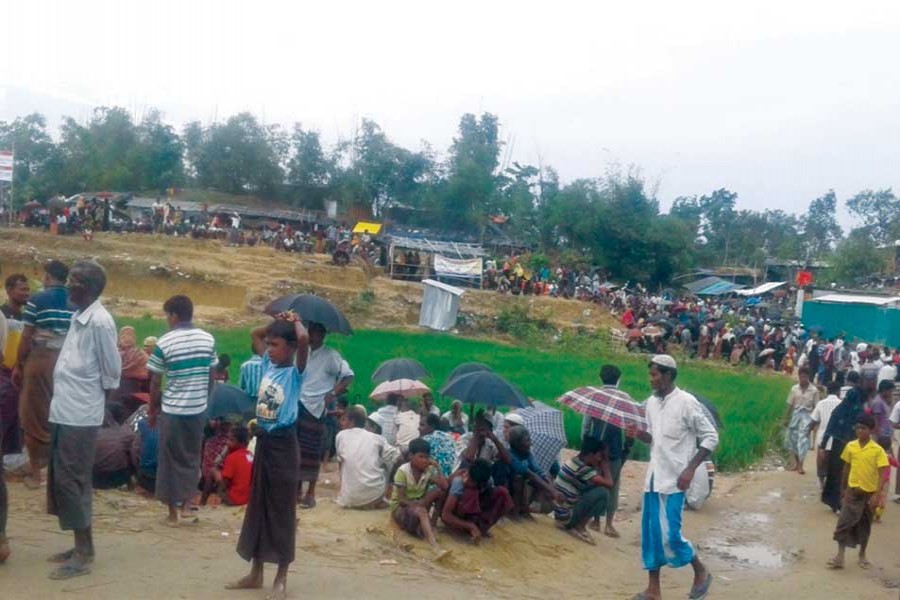Proper humanitarian response to stop and ease humanitarian sufferings at any place of its origin is sought by people all over the world. From time to time, such responses have been modified at different levels considering the needs, quality, accountability and others.
Those who are now involved with humanitarian responses to the Rohingya people, are gradually becoming aware of their many actions to maintain the Core Humanitarian Standard (CHS).
The CHS on quality and accountability is a direct outcome of the Joint Standards Initiative (JSI) in which three organisations including the Humanitarian Accountability Partnership (HAP) International, People In Aid, and the Sphere Project are working together to seek better coherence for implementers of humanitarian standards.
So, the CHS is the international standard guideline that has been developed for organisations and individuals, who serve and are involved with humanitarian response in any locations. It aims to ensure the quality and accountability of the services through nine commitments mentioned in the CHS. These commitments describe what the vulnerable communities expect from organisations and individuals, while delivering humanitarian assistance during any natural or man-made disasters.
Each of the commitments is assigned by a quality criterion guide how assistance should be designed for the vulnerable community. The CHS promotes respect for any kind of humanitarian services to the affected people in keeping with their fundamental human rights by strengthening the right to live with dignity, protection and security.
In response to such violent repression, the government of Bangladesh calls for humanitarian action for helping the forcefully migrated Rakhine population. Therefore, the humanitarian actions have made a commitment to the nine standards of the CHS, where the activists of humanitarian organsiations should have an opportunity for their self-assessment in the humanitarian services. Evaluating the past and present learning experiences of the organisations, the humanitarian services could be more impactful to ensure an international standard aid service now and in the future. Through these services, there is an opportunity to learn the multi-decision making criteria of the CHS, e.g. timeline operation, need based operation, communication, collaboration etc.
The three non-governmental organizations (NGOs) share the following observations based on their experiences:
According to the CHS standards, first the service ought to be based on their needs. The victim reported very frequently that they got shelter and security, which gives them peace of mind. Besides, safety of woman and children has been assured.
Secondly, community people reported that they received the aid in time, especially shelter and security that was quite effective for them, which has been considered the second commitment in the CHS.
The third commitment concerns strengthening the local capacities to avoid negative effects. Initially, the local communities didn't welcome them cordially as they felt those outsiders are the shareholder of their needs. However, it has been well-managed. The situation is stable barring a few unpleasant incidents.
According to the fourth standard, the communities are aware of information and are capable of participating and sharing feedback. They elect a person within their community called 'Majhi', who is the community representative and vocal for their problems.
The state agencies, especially the Bangladesh Army, helped them to elect the representative through voting. If these representatives complain about a problem, it is considered by the aid agencies for immediate solution. Thus the fifth standard of CHS has been full-filled.
Besides, the humanitarian activities are well-coordinated through continuous improvement and learning. For an example, initially it was unclear which food or cloths are suitable for the Rohingya communities.
Many agencies distributed traditional Bangladeshi clothes, which were useless. Later on, the aid agencies identified their needs and supported them accordingly. This fulfilled the criterion of standard of six and seven. But the organsiations working there do not find all the services at a time, which are treated fairly and equitably in their humanitarian response.
As Rohingya communities allege this may have happened because of religious and social class biases in the community, which violate the standard of eight and nine in the CHS.
However, these issues are not only an important concern in the context of those humanitarian standards, but also the present trend of the country's sustainable development makes it more vibrant, since the humanitarian workers are unexpectedly facing a huge challenge over the management of social sustainability of the Rohingya communities (more than 1.0 million) in Bangladesh. Considering the sustainability principles in humanitarian responses, social violations should be minimised by taking the required actions in line with the CHS.
According to the recognised sustainability framework, humanitarian responses cannot violate any type of peoples' rights and dignity towards achieving a sustainable society. In principle of sustainable society, the humanitarian workers are not subject to conditions that systematically undermine the Rohingyas' capacity to meet their needs.
Finally, the humanitarian organisations are improving their plans and actions in the humanitarian services day by day. Since Bangladesh is a disaster-prone area, they are taking a lot of humanitarian initiatives every year. But they have to be more strategic in implementing the meaningful CHS by taking more development programmes in some major areas, e.g. communication and networking with the victims; development of complaint and feedback addressing mechanism, which is very important in our country context; and need-based periodic survey intended for concrete data protection strategy.
In addition, the process of self-assessment needs to be done by these humanitarian organisations time to time on behalf of individual, institutions, donors, or any kind of service providers in respect of the core humanitarian standard.
The writers are Senior Research Associates of BRAC Research and Evaluation Division.


